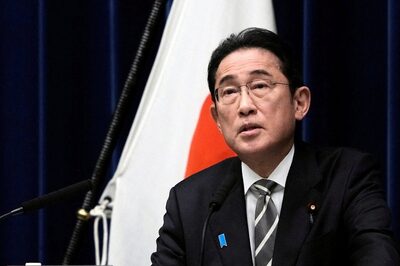
views
New Delhi: In the biggest reduction in 28 years, the government on Friday slashed corporate tax by almost 10 percentage points as it looked to pull the economy out of a six-year low growth and a 45-year high unemployment rate by reviving private investments with a Rs 1.45-lakh crore tax break.
Just months after presenting her maiden Budget that was hailed as "development-friendly" and "future-oriented", Sitharaman announced cutting corporate tax rate to 25.17% to bring them at par with other Asian countries such as China and South Korea but at the expense of potentially breaching the 3.3% fiscal deficit target.
Markets celebrated the announcement, with the BSE Sensex jumping by the most in a decade while the rupee also climbed against the US dollar.
Logging its biggest intra-day spike in over a decade, the 30-share BSE Sensex index soared 2,284.55 points to a peak of 38,378.02, before settling 1,921.15 points or 5.32% higher at 38,014.62.
In the fourth tranche of post-budget economic stimulus measures, Sitharaman cut base corporate tax for existing companies to 22% from the current 30%; and for new manufacturing firms, incorporated after October 1, 2019, and starting operations before March 31, 2023, to 15% from current 25%.
This will be subject to the condition that these companies will not avail any other incentive or concession such as tax holiday enjoyed by units in Special Economic Zones (SEZ) and accelerated depreciation.
The effective tax rate for existing units, after considering surcharges and cess such as Swachh Bharat cess and education cess - which are levied on top of the income and corporate tax rates - will be 25.17% as compared to 34.94% now. For new units, it will be 17.01% as against 29.12% now.
The new tax structure, which will lead to government losing Rs 1.45 lakh crore in revenue annually, is effective from April 1, 2019, and will bring Indian corporate tax rate at par with Asian peers in a bid to attract investments.
The reduction in corporate tax, which India Inc hailed as the one which will revive growth and investment, is the single biggest cut in tax rates since India opened up its economy in 1991.
India had the highest effective corporate tax rate of 38.05% in 1997.
After Sitharaman unveiled the measures to boost the economy, Prime Minister Narendra Modi said “historic” announcements in the last few weeks clearly demonstrate that his government is leaving no stone unturned to make India a better place to do business and improve opportunities for all sections of society. It will increase prosperity and make India a $5-trillion economy, he said on Twitter.
"The step to cut corporate tax is historic. It will give a great stimulus to ‘Make In India’, attract private investment from across the globe, improve competitiveness of our private sector, create more jobs and result in a win-win for 130 crore Indians," he said.
However, Opposition parties attacked the government for "deepening economic crisis", its "bankruptcy of ideas" and lack of benefits for the common man. The Congress linked the announcements with Modi’s US visit and saying it was "amazed" at what he will do for a stock market bump ahead of his Houston speech. Modi left for a week-long visit to the US.
'Positive step'
Sitharaman said the latest measures will promote growth and investment, but sidestepped questions on its impact on fiscal deficit.
"We are conscious of the impact all this will have on our fiscal deficit, and will reconcile the numbers," she said adding the changes in tax rate are being done by promulgating an ordinance to amend the Income Tax Act.
The government had budgeted Rs 16.5 lakh crore as tax revenue in fiscal to March 31, 2020. Calling it a bold move, RBI Governor Shaktikanta Das welcomed the announcement.
Sitharaman also said no tax will be charged on share buyback by listed companies that announced such a move prior to July 5.
Also, super-rich tax by way of enhanced surcharge on income, announced in the July 5 Budget, will not apply to capital gains arising on equity sale or equity-oriented funds liable to securities transaction tax (STT) with a view to stabilise flow of funds into capital markets.
Also, the companies will not have to pay minimum alternate tax (MAT). She said any company which does not opt for concessional tax regime and avails tax exemptions or incentives shall continue to pay tax at pre-amended rates. "These companies can opt for concessional tax regime after the expiry of tax holiday or exemption," she said.
Terming the reduction in corporate tax as a "positive step", IT industry body Nasscom said the decision will help in improving the global competitiveness of Indian industry.
"It is a positive step towards empowering India and boosting Indian economy and to promote growth, investments, employment. The reduced effective peak tax rate of 25.17% means an effective tax rate reduction of almost 10%," Nasscom said in a statement.
"The steps to pump-prime the economy will lead to a big reset and revive the animal spirits in corporate India. The tax reduction will not only lead to economic buoyancy but will also make the industry more competitive globally," Aditya Birla Group chairman Kumar Mangalam Birla said, adding that these measures only reaffirm the government's willingness to move beyond incrementalism and act with conviction to pursue economic reforms.
'Decisions to benefit economy'
Tata Steel managing director TV Narendran said, "I guess the challenge for the government is to find alternate revenue streams to support the massive infrastructure spends planned."
JSW Group chairman Sajjan Jindal said, "The sharp tax cuts and special tax rate for fresh investments in manufacturing would not only revive sentiment but also enhance our competitiveness."
The travel and tourism industry also welcomed the decision.
"This move will certainly see infusion of positive sentiment in the industry at large, more so in the current environment," Thomas Cook India Chairman & MD Madhavan Menon said. "We anticipate positive impact for the travel and tourism sector, and with it a boost to our corporate and MICE (meetings, incentives, conferences and exhibitions) travel segments as well."
"This is a bold step to provide fillip to the Indian economy," OYO India and South Asia CEO Aditya Ghosh said.
Realtors also hailed the government's decision to cut corporate tax, saying the move will have a ripple effect on all sectors including real estate, improve liquidity of cash-starved developers and boost property demand especially in the commercial segment.
Realtors' apex body CREDAI Chairman Jaxay Shah said, "It's a full house blockbuster Friday for India Inc. Game changer announcements. Market sentiment will change completely in all sectors including real estate".
"It is a due corrective step by the Centre to uplift investor's sentiment and prompt investment back in drying up Indian economy. The move is well intended to revive growth traction of the economy," said Niranjan Hiranandani, President, NAREDCO.
The tax incentives will significantly boost investments, manufacturing and shipments in different sectors such as leather and footwear, exporters said. "As about 92% of the leather and footwear industry is concentrated in MSME segment. Lower tax slabs hold the key to achieve the envisaged growth and investment levels," said Council for Leather Exports (CLE) Chairman Pararuna Aqeel.
(With inputs from PTI)




















Comments
0 comment